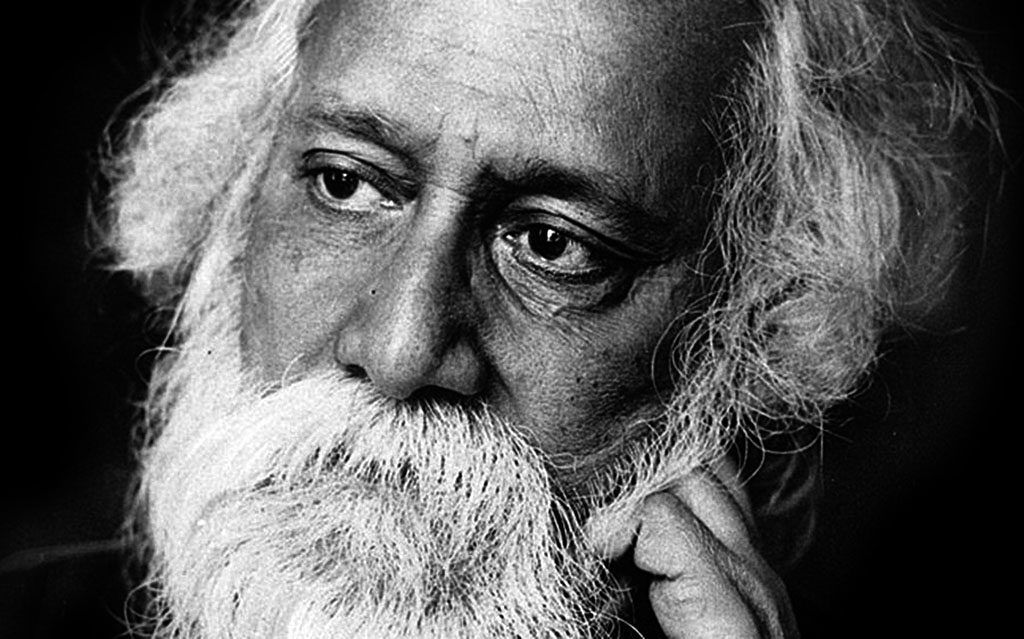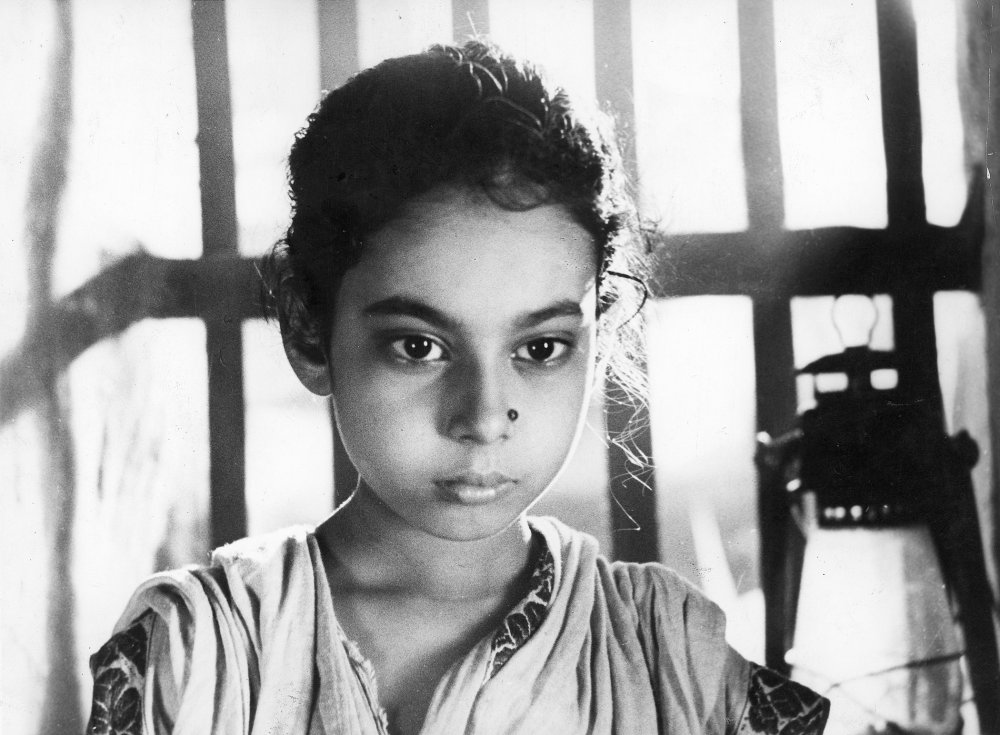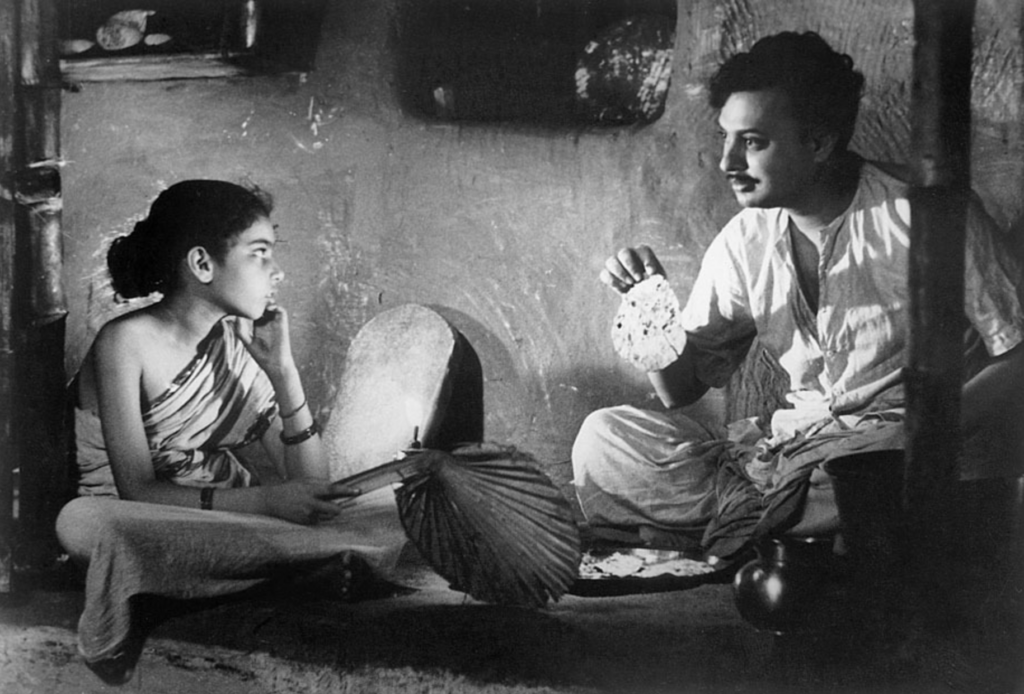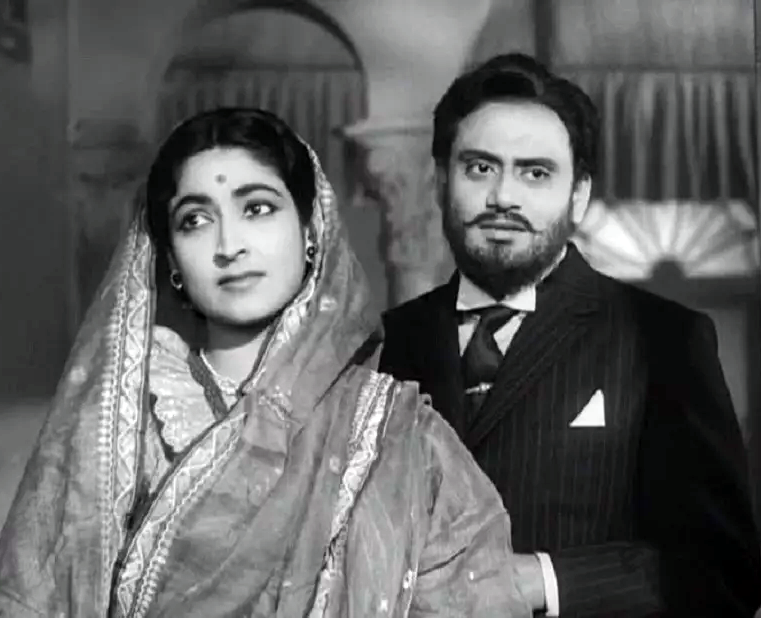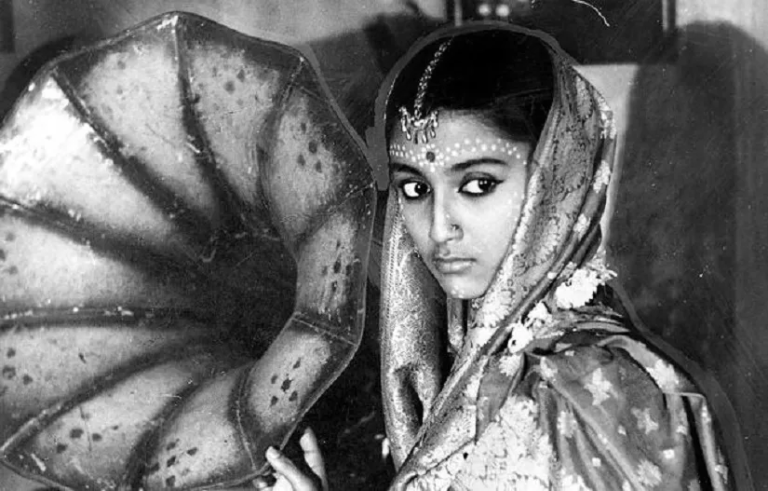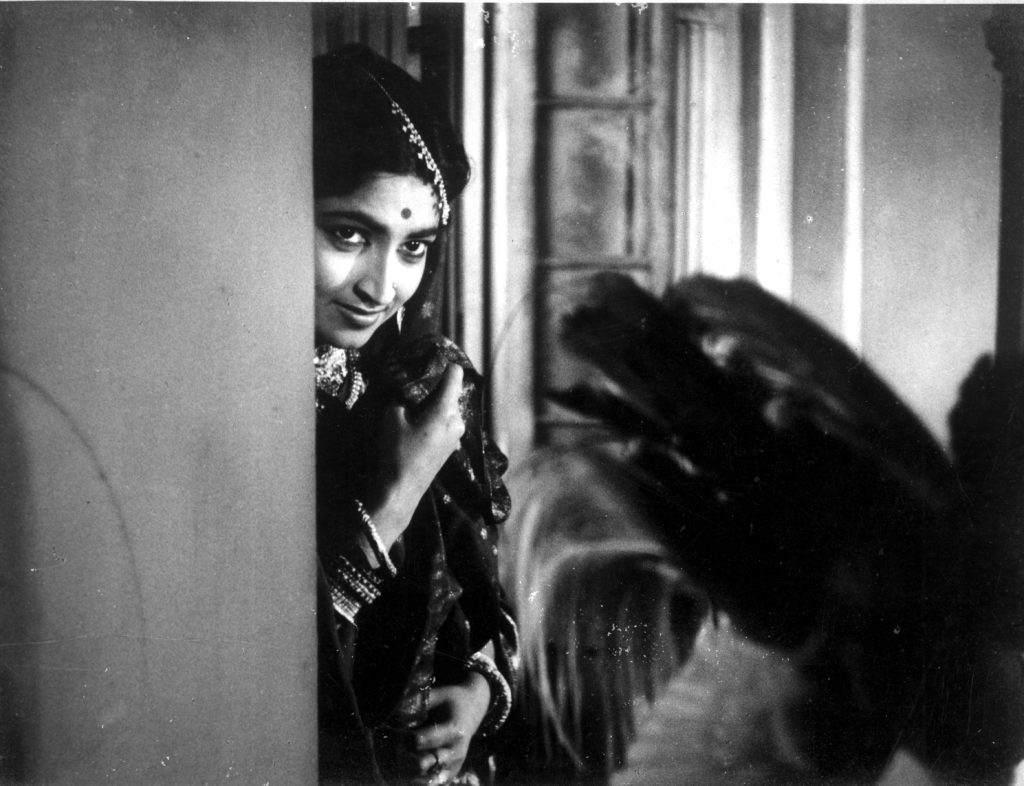Teen Kanya (Three Daughters / Two Daughters)
1961, India. B/W In Bengali with subtitles
The title “Teen Kanya” means three daughters (or three girls), but the international version of the film is called “Two Daughters”. This is because the feature has three different stories; however, only two of them were included for the international release: The Postmaster 56 min. and Samapti 56 min
Teen Kanya: The Postmaster 56 min.; Monihara 61 min.; Samapti 56 min.
Summary
This anthology film was released in India as “Three Daughters”. It was a feature composed of three episodes: The Postmaster – 56 min., Monihara – 61 min., and Samapti – 56 min. Monihara (The Lost Jewels) was left out from the international release probably due to concerns about length and subtitles not being ready for Monihara. The female characters that are central to the stories link the three episodes. Ray adapted three short stories by Rabindranath Tagore as a tribute to the author to mark his birth centenary in 1961. He also made a documentary “Rabindranath Tagore” as part of the celebrations.
The Postmaster
The Postmaster Nandalal (Anil Chatterjee), a young man arrives from Calcutta as the postmaster of a small village Ratan (Chandana Banerjee), a pre-adolescent orphan girl, is his housekeeper/maid. Though only a child herself, she cooks, cleans and cares for Nandalal.
Nandalal, a city bred young man, is like a fish out of water in the village. He is bored. On an impulse and probably to kill time, he begins teaching her to read and write. She responds eagerly. A tender bond develops. Ratan is devoted and waits on him. For Nandalal, however, she is just a pastime.
When Nandalal contracts malaria, Ratan nurses him back to health. But he has had enough of the rural life and resigns. Ratan is heartbroken. He prepares to leave without realizing how attached to him Ratan has become.
Ratan is hurt when Nandalal offer her some money as a tip for her services. We see her passing by Nandalal carrying a pail of water. She has been crying but too proud to accept the tip. A few moments later we hear her voice. She is informing the new postmaster that she has brought water for him.
Nandalal is overwhelmed by emotions as he stares at the money in his hand. Putting the money back in pocket, he walks away.
Monihara (The Lost Jewels)
Near an abandoned mansion, the village schoolteacher (Gobinda Chakravarti) recounts a story to a hooded man.
It seems that the house was inhabited by a man Phanibhusan (Kali Banerjee) and his wife Manimalika (Kanika Majumdar).
The wife is obsessed with jewels and ornaments. She accumulates jewels by nagging her husband. Though they have been married for a long time, she is very cold to him. The husband keeps buying jewels for her in hope of gaining her love.
She has a phobia that one day he may ask the jewels back. A fire destroys his business. To confirm her fear, she offers to sell her jewels. But when he shows some interest in the idea she retreats in panic.
When the husband is away to raise money, she calls her cousin to escort her to her parents’ house. The cousin, though, has other plans for the jewels. We see the wife for the last time as they leave the house with all the jewels.
The husband is puzzled at the missing wife and the jewels. He is haunted by what seems to be her ghost. After a series of such incidents, he finds himself facing the ghost of his wife, a black silhouetted figure. The black figure claims be his wife. Afraid, he reaches for a jewel box that he had brought for her on his last trip. The black figure, still wearing gold bangles, charges to grab the jewel box with a horrible laugh.
After listening to the tale, the hooded man says that he has enjoyed the story but it has many errors. He reveals that he is the husband in the story and disappears.
Samapti (The Conclusion)
Amulya (Soumitra Chatterjee) is returning to his village after passing his exams in Calcutta to spend some time with his widowed mother. After getting down from the boat as he struggles in the muddy path, he senses that someone is following him. Soon he finds out it is a tomboyish teenager Mrinmoyee (Aparna). She bursts into giggles at his plight and runs away.
The mother has arranged for him to marry the daughter of a respectable family. Much against his wishes he goes to visit the girl in a nearby village, carrying an umbrella and wearing shinning shoes. The girl is very conventional and he is forced to admire her needlework, singing and her other skills.
Suddenly, Mrinmoyee, known as Paglee (madcap) charges in following her pet squirrel. Then he finds his shoes gone. As he sets out to walk back to his village, he finds one of his missing shoes in the mud path. Amulya captures the culprit, Mrinmoyee. It is now her turn to fall in the slushy mud. Amulya is amused and probably also in love.
Against his mother’s wishes, he marries Mrinmoyee. On their first night together, she escapes by climbing down a tree and spends the night on her favorite swing on the riverbank. It is scandal. She is locked in her room and in a childish tantrum throws thing at Amulya. He returns to Calcutta and she is sent back to her mother’s house. . Once he is gone, she realize how much she really loves him.
His mother makes Amulya come back on a false pretext of her illness. Amulya goes in search of Mrinmoyee in rain. Unable to find her he returns, only to find her in his room. He asks her how she managed to sneak in. She replies, ‘By climbing the tree, but I’ll not do it again’. She is no longer a childish madcap but a grown woman in love..
Comments
The Postmaster is definitely one among the best films by Satyajit Ray. Simple narrative, straightforward story telling and brilliant performances by Chandana Banerjee as Ratan and Anil Chatterjee as the postmaster, Nandalal. Very touching but without any hint of melodrama, the parting of the postmaster and Ratan is pure cinema at its best. The sequence has very little dialogue.
All three stories are individual films in their own right and representative of Ray’s many films.
What others say…


Awards
- President’s Silver Medal, New Delhi, 1961 (for Samapti)
- Golden Boomerang, Melbourne, 1962 (for the Two Daughters)
- Selznik Golden Laurel Award, Berlin, 1963
Credits | |
| Producer: | Satyajit Ray Productions |
| Screenplay & Direction: | Satyajit Ray, Based on three short stories by Rabindranath Tagore: Postmaster, Monihara, and Samapti. |
| Cinematography: | Soumendu Roy |
| Editing: | Dulal Dutta |
| Art Direction: | Bansi Chandragupta |
| Sound: | Durgadas Mitra |
| Music: | Satyajit Ray |
Cast | |
The Postmaster | |
| Nandalal: | Anil Chatterjee |
| Ratan: | Chandana Banerjee |
| Bisay: | Nripati Chatterjee |
| Khagen: | Khagen Pathak |
Monihara (The Lost Jewels) | |
| Phanibhusan Saha: | Kali Banerjee |
| Manimalika: | Kanika Majumdar |
| Madhusudhan: | Kumar Roy |
| Schoolmaster and narrator: | Gobinda Chakravarti |
Samapti (The Conclusion) | |
| Amulya: | Soumitra Chatterjee |
| Mrinmoyee: | Aparna Das Gupta |
| Jogmaya: | Sita Mukherjee |
| Nistarini: | Gita Dey |
